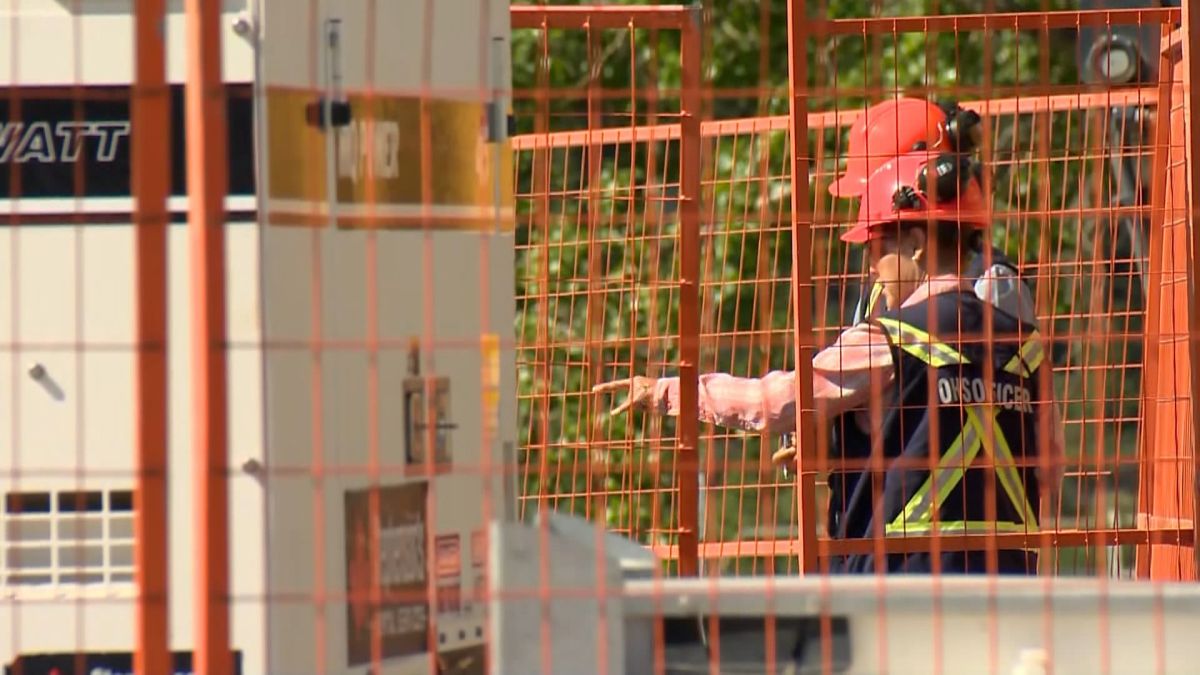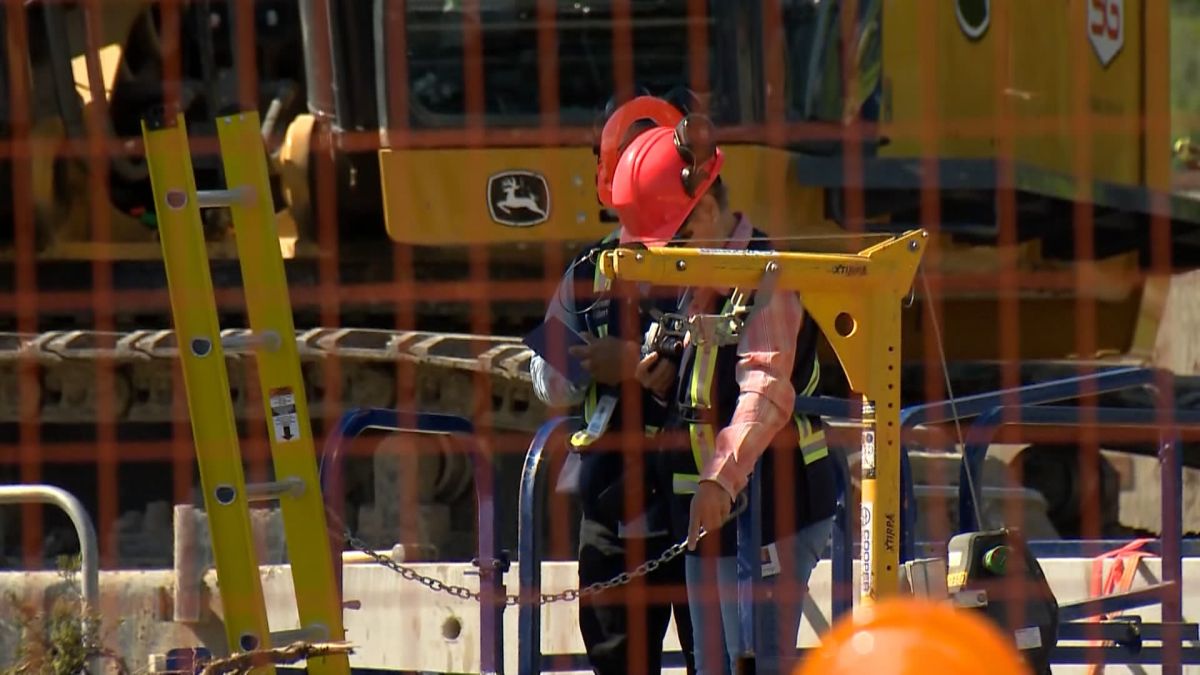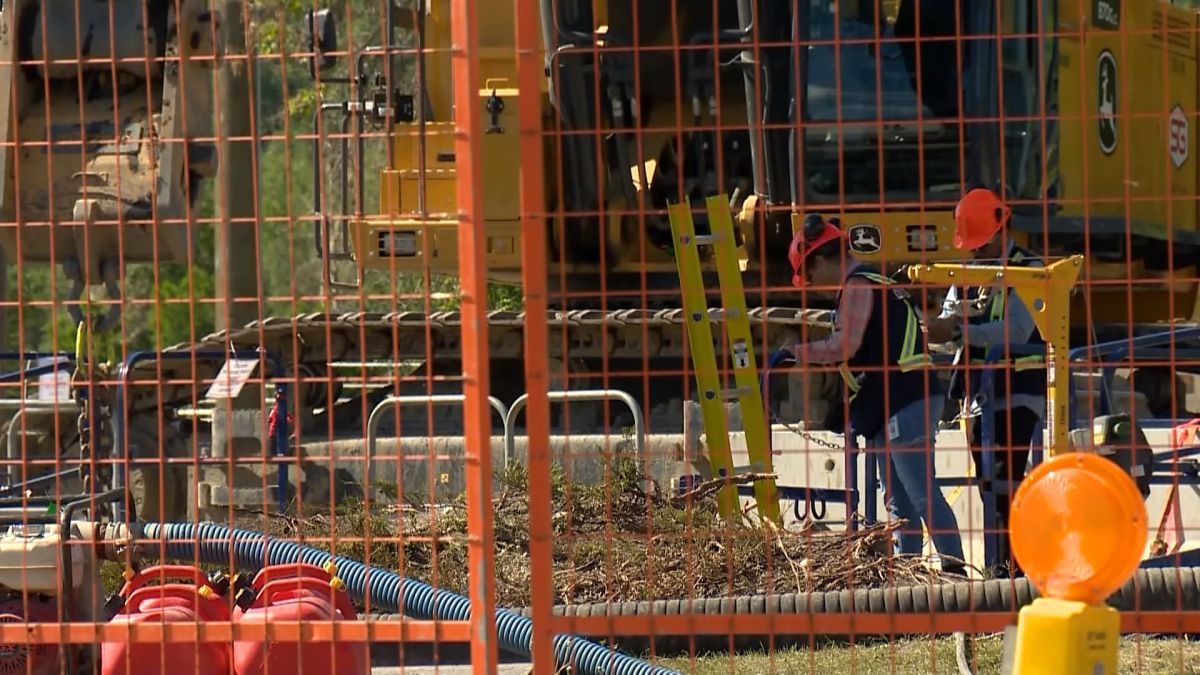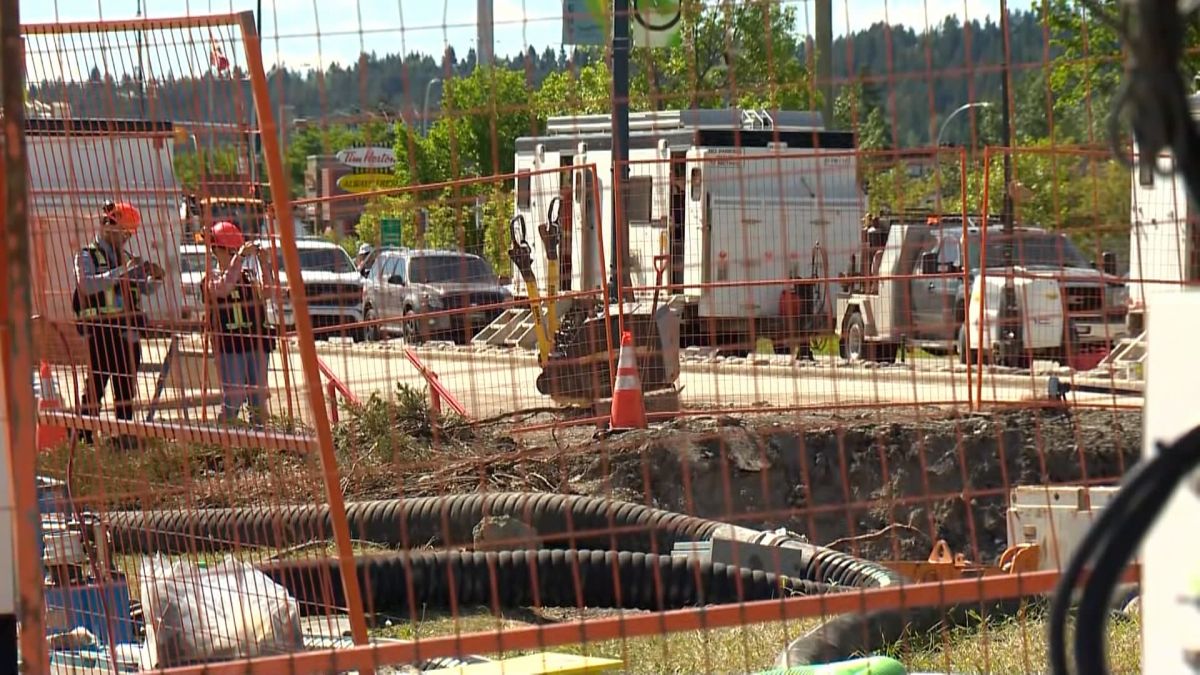Welding work at the site of a massive water main break in Calgary was expected to resume on Thursday afternoon after a workplace incident that sent two people to hospital prompted a temporary work stoppage.

The issue with a feeder main has now threatened the city’s water supply for more than a week.
At a news conference on Thursday afternoon, the City of Calgary’s director of occupational health and safety said safety protocols still need to be determined but that OHS inspectors are satisfied work can resume at the site in the northwest part of the city.
Chris Collier was joined at the media availability by Mayor Jyoti Gondek, Calgary Emergency Management Agency chief Sue Henry and Francois Bouchart, the city’s director of capital priorities and investment.
When asked if the temporary work stoppage would affect the city’s timeline to complete repairs and to restore normal water service, Bouchart acknowledged that it would.
On Thursday morning, one week after the city issued a critical water supply alert following the catastrophic water main break, Gondek first announced that repair work on the feeder main had been paused becase of workplace injuries.
OHS inspectors were seen at the site throughout the morning, and Collier said shortly after 10:40 a.m., the department determined work could resume once safety protocols were in place.
While delivering an on-camera statement Thursday morning, Gondek warned that in addition to the concern for the injured workers, the city is currently “at a place where we don’t have enough of a cushion for emergencies.”
- Two men charged after violent attempted kidnapping in downtown Calgary
- Calgary family living in a car calls for more resources for unhoused families
- 2 Jasper hockey players killed in crash with semi on way home to Hinton
- ‘I’ve never seen this much misery,’ says Calgary man on the front lines in Ukraine
“Those emergencies include use in hospitals and in firefighting,” she said. “There’s still a real threat that we could run out of water.
“I want you to think about a fire truck pulling up, facing a serious situation. They hook up to a hydrant and dribbles come out. This could be a reality if we don’t start conserving more water.”
Gondek began her address by bracing Calgarians for what her update would entail.
“I have difficult news to share with you this morning,” she said. “Two people were injured on site overnight. Both were taken to hospital and neither are in critical condition.
“Crews instituted an immediate safety stop, and work on the pipe has been halted. ”
Gondek thanked the crews for their hard work and said “our hearts are heavy at the city this morning.”
David Duckworth, the City of Calgary’s chief administrative officer, said one of the injured workers is a city employee and the other is a contract employee.

Get daily National news
He said the injuries occurred at about 10 p.m. local time on Wednesday.
A spokesperson for Emergency Medical Services in Calgary provided details to Global News about when paramedics were called to the 16th Avenue construction site.
Stuart Brideaux said two adults were injured when “a chain failed and broke, striking them.”
He said one of the injured people was taken to hospital in serious but stable condition while the other was considered to be in stable condition.
The nature of the injuries was not disclosed.
Earlier this week, emergency officials offered a rough timeline for repair work on the feeder main and said they hoped to have that work completed on Thursday sometime.
Flushing and filling the pipe is expected to take another three days, and preparing to allow for water flow into the city’s reservoirs is expected to take a couple of more days.
Bouchart explained Thursday how he expected the overnight work stoppage would impact the timeline.
“We always take worker safety extremely seriously. So stopping and addressing the safety issue was a must,” he told reporters. “Yes, it will impact our timelines and we’re currently assessing what does that look like?”
He said he believes a return to normal water services will be delayed by a day or two from the original timeline.
“This is not adding a week.”
As a result of the break last week, Calgarians across the entire city were told to stop using water outdoors and do their best to minimize indoor water use.
While Gondek said she knows many Calgarians have been trying to conserve water, those efforts need to be ramped up as “usage has been creeping up” every day since Saturday.
“Yesterday, our consumption rose again — this time by nine million litres,” she said. “That is taking us far over the safe threshold. And our supply is lower than it has been in the last few days.
“Calgarians, I need you to do more, and I know that’s frustrating for you to hear.”
Gondek said Calgarians are “all in this together.”
“I now must ask you to do more on your water conservation, to support those that are working to restore our safe water supply.”
Gondek reminded Calgarians that in addition to the Stage 4 outdoor water restrictions being in place, the city remains under a fire ban. That ban was put in place as officials aim to mitigate the risk of fire crews requiring large amounts of water for fires or other unforeseen circumstances until water services return to normal.
Henry told reporters about a fire that crews responded to in southwest Calgary on Wednesday night to demonstrate how much water firefighters need.
“Approximately 100,000 litres of water was used to extinguish the fire,” she said, suggesting that is actually a much smaller amount than it could have been thanks to “quick response efforts.”
Henry said some fires in the city require more than one-million litres of water to battle a blaze.
Henry said the city has so far issued 376 written warnings in connection with the fire ban and water restrictions. She said two tickets have been issued for water misues and one was issued for someone violating the fire ban. She added that if Calgarians see city crews watering green spaces in the city, they should know the crews are not using potable water and that the city’s water supply is not impacted by that work.
When asked why car washes in Calgary are not being forced to close amid the crisis, Gondek noted that she has been “briefed that many of these organizations use recycled water.”
She added that as various concerns are raised, the city is “actively looking at what else we need to do in terms of putting restrictions in place.”
The massive water main break that led to the crisis occurred on the evening of June 5.
City officials have described the broken feeder main as a “critical water transmission line.” They note the damage has “severely impacted” Calgary’s water supply and the ability to move water across the city.
City officials have said they still do not know how the feeder main broke. Duckworth addressed that on Thursday.
“I know Calgarians still have many unanswered questions,” he said. “After every emergency, we conduct a thorough post-incident review to understand what happened and why, and what actions we can implement in the future.”
City officials have said the damaged line, which normally carries 60 per cent of the city’s water, was 49 years old when the break occurred. It was expected to last for 100 years. They added there was no indication from monitoring that the pipe was about to fail.
One official said physically inspecting the pipe would have meant crews would need to shut it down and dig it up, which would put stress on it and other pipes.
Bouchart said Thursday that the replacement pipe is now in place and that about 80 per cent of that four-kilometre section of pipe has already been inspected.
“We have moved the damaged pipe off site and will continue to examine it,” he said. “I want to stress that it will take some time to determine the exact cause (of the damage).
“For now, our focus remains on the repair, crew safety.”
For the latest updates from the City of Calgary, you can follow the city’s social media channels or click on its website here.
For the latest Alberta Emergency Alerts, you can click on the province’s website here.

–With files from Bob Weber, The Canadian Press


















Comments
Want to discuss? Please read our Commenting Policy first.